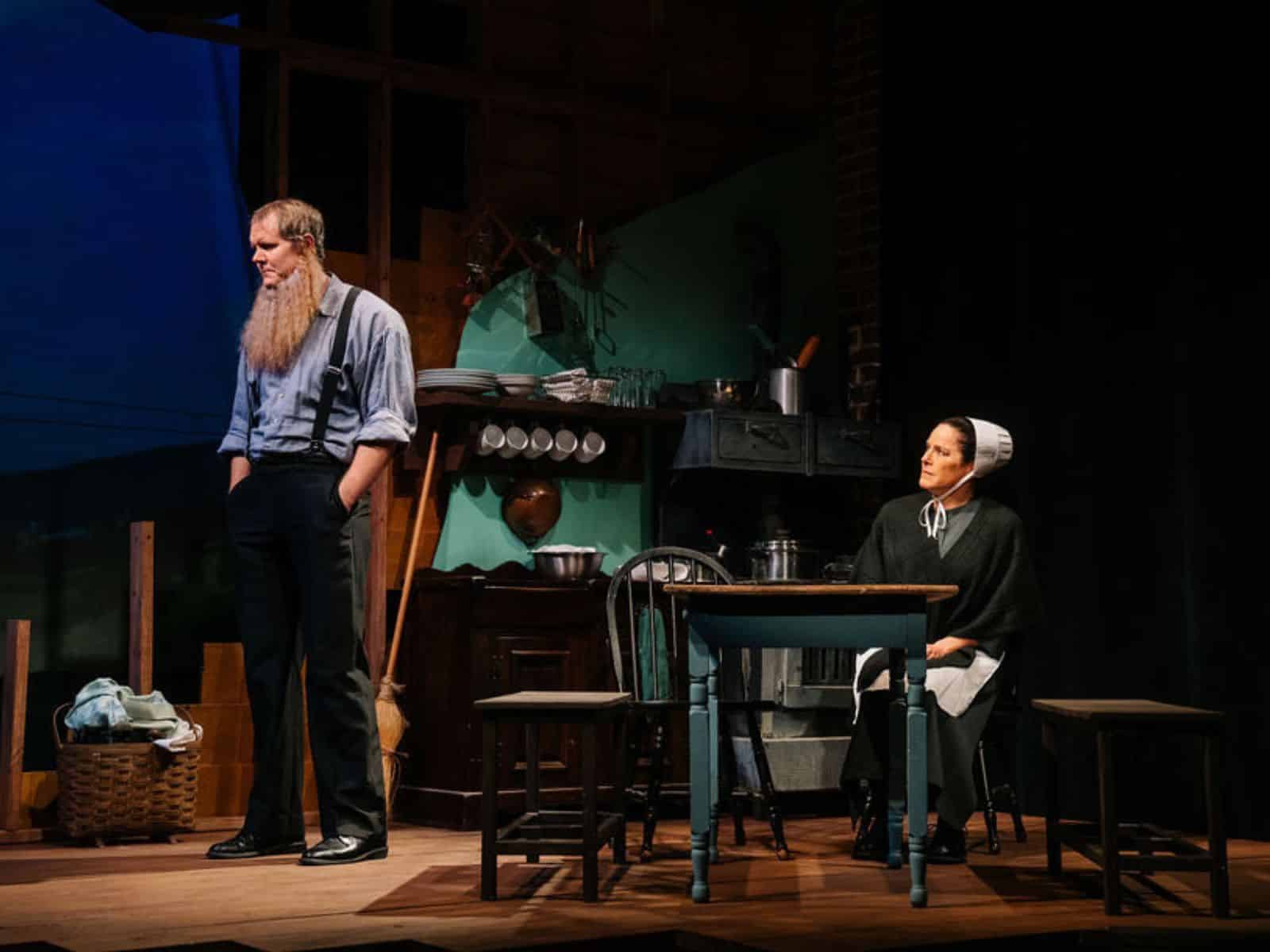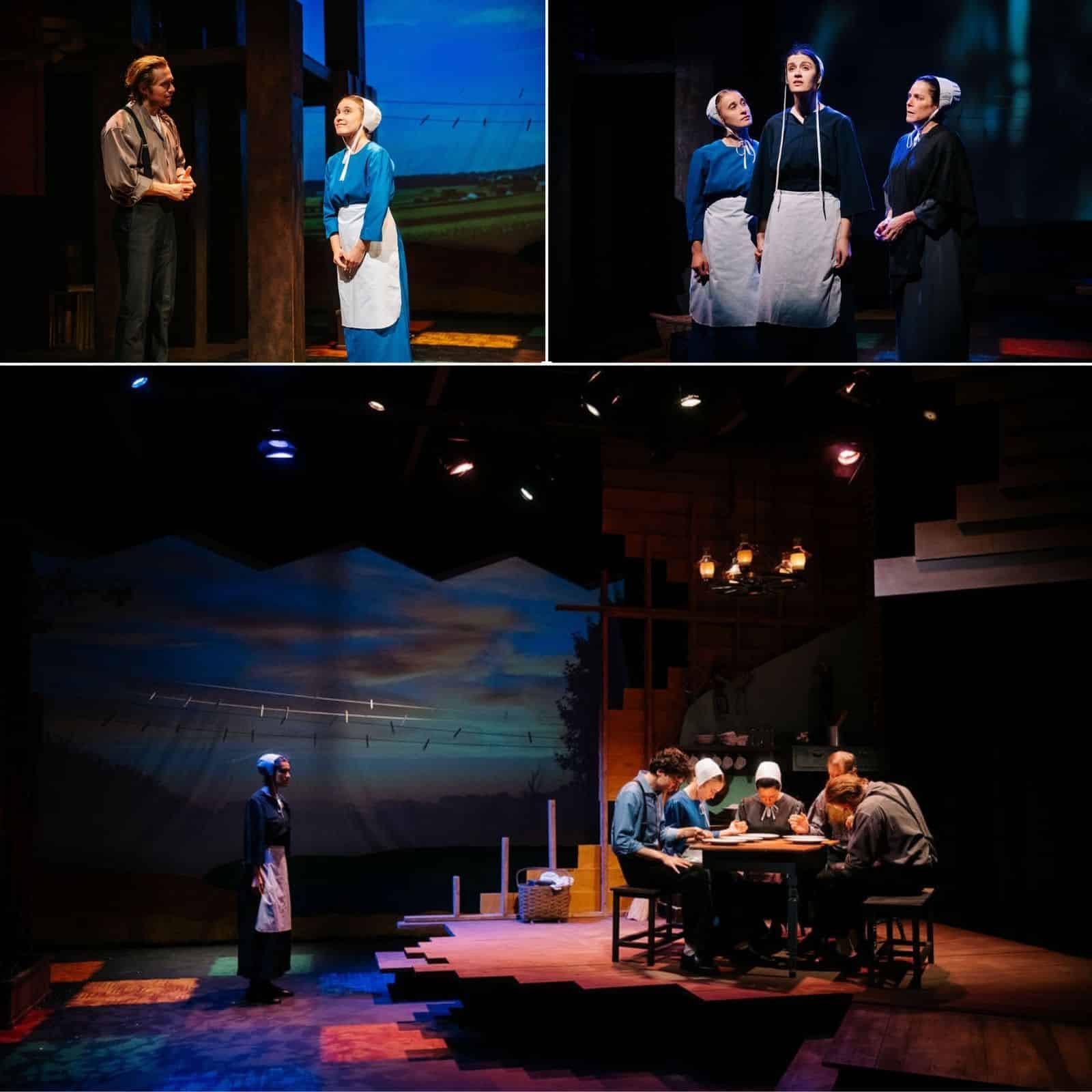Everything certainly isn’t wonderful at present. Whatever horrors the near future holds in store, one day it will have passed; then we’ll have to start rebuilding our relationships with people who have hurt us, or whom we have hurt, and tend to the long process of healing and forgiveness. Or not.
Keegan Theatre is offering a cautionary tale about how fraught this process is, with a quietly powerful offering of Chelsea Marcantel’s Everything Is Wonderful at their Church Street theater through October 5. The play had been previously staged five years earlier at Baltimore’s Everyman Theatre, but this is the DC premiere.

In a Western Pennsylvania Amish community, husband and wife Jacob and Esther have barely had time to mourn the deaths of their only two sons, Levi and Joshua, when at their door arrives Eric, the distracted city boy who drove into their buggy and killed them. Although he had been on a boozy four-day bender, he was legally sober at the time of the accident and ended up facing no charges. He’s guilt-ridden, seeking forgiveness, and wants to make atonement.
This opens a large can of worms, as Amish culture is very much focused on radical forgiveness, leaning on platitudes like the play’s title, which reads as superficial in the interest of moving on with their duty to God and the community and leaving the raw hurt, loss, and anguish to fester. Despite the obvious pain Eric’s presence is causing them, Jacob and Esther take him in, and he works, albeit incompetently, for his keep. Although he has to sleep in the barn due to the presence of their daughter Ruth, he has a seat at their dinner table.
Who doesn’t have a seat at their table is Miri (short for Miriam), their older daughter, who has returned home following the accident after being excommunicated from the community years ago. On arrival, she is not welcomed inside and has to eat her meals on the porch and sleep in the barn. The reason for her leaving is a story told mainly in flashback and involves the young man next door, Abram. When she realizes Abram is now courting her younger sister, the wide-eyed, dutifully innocent Ruth, she must confront her unresolved trauma. Her perspective is telling: “Forgiveness,” she notes, “is a shortcut to get around the messy parts.”

The power of Marcatel’s script lies between the lines in the tense silences. Under the family’s placidity and platitudes lie roiling seas, and when the facades crack, the play finds its most memorable moments. A harrowing scene involving Esther and a basket of eggs will linger long after the final bows, and the simultaneous climactic catharses evoke the heightened emotional crests of the great 20th-century dramas of O’Neill, Miller, et al.
Director Josh Sticklin keeps the steady, measured pace, letting the play find its own rhythm without feeling overlong. I will confess to initially struggling to follow the flashbacks, as they don’t particularly establish themselves in an earlier time or place, so I thought a few of them at first were just other scenes happening in the same timeline as the rest of the story. I eventually caught up.
The ensemble of six distinguishes itself in handling the challenging emotional material. Keegan co-founder Susan Marie Rhea and Michael McGovern, as the grieving mother and father, stand out, though Leah Packer’s Miri carries the show as the black sheep of the family, struggling to find herself outside the community she grew up in.
Ben Clark is deceptively winsome as Abram, giving hints of his dark undercurrents. As Ruth, Sasha Rosenbaum creates a tragic portrait of a naive young woman wrestling with her duty to God and the community, and the dawning recognition that she might not want to marry Abram, or anyone for that matter. Max Johnson, as the outsider Eric, creates a very effective portrait of a lost young man whose need for atonement might be a little too self-obsessed.
Sticklin also designed the set, rich and vibrant in detail and color, down to the quilt pattern coloring on the floor, dressed by Cindy Landrum Jacobs’ props and set dressing and warmed and cooled by Hailey LaRoe’s lighting and projections. Paris Francesca’s costuming effectively recreates the simple, unadorned Amish clothing, which contrasts sharply with Eric and Miri’s contemporary garb.
What getting back to some sense of normalcy will require from us may vary, but the potentials and pitfalls of radical forgiveness and the strengths and challenges of moving forward are on display on Church Street, and give us all a great deal to consider. Everything Is Wonderful will linger in your mind days after seeing it.
Running Time: Two hours and 30 minutes including one 15-minute intermission.
Everything Is Wonderful plays through October 5, 2025 (Thursdays to Saturdays at 8:00 pm, Sundays at 3:00 pm, and select Mondays and Wednesdays at 8:00 pm), at The Keegan Theatre, 1742 Church St NW, Washington, DC. Tickets are $55 ($44 for seniors and students) and available online.
Everything Is Wonderful
By Chelsea Marcantel
Directed by Josh Sticklin
CAST
Ben Clark (Abram), Max Johnson (Eric), Michael McGovern (Jacob), Leah Parker (Miri), Susan Marie Rhea (Esther), Sasha Rosenbaum (Ruth). Understudies: Adian Chapman, Millie Greenberg, John Henry Stamper, Martina Schabron.
PRODUCTION
Scenic Design: Josh Sticklin, Assistant Director: Jared H Graham, Dramaturg: Katrina Heil, Sound Designer: Tony Angelini, Costume Designer: Paris Francesca, Production Manager: Gabrielle Busch, Stage Manager: Emilie Knudsen, Fight & Intimacy Coordinator: Sierra Young, Lighting & Projection Designer: Hailey LaRoe, Props & Set Dressing: Cindy Landrum Jacobs, Dialect Coach: Zach Campion, Vocal Consultant: Brigid Wallace Harper, Assistant Stage Manager: Anahita Sepehri
SEE ALSO:
Keegan Theatre announces cast and team for ‘Everything Is Wonderful’ (news story, August 28, 2025)



